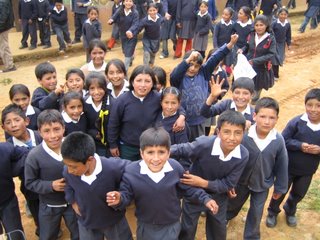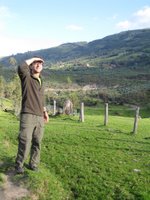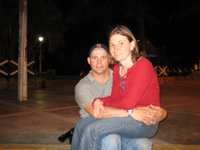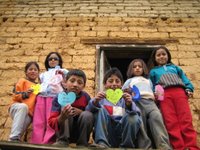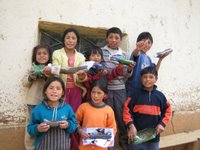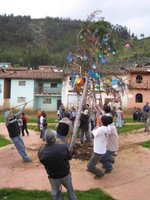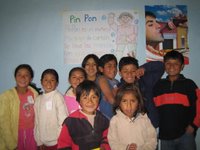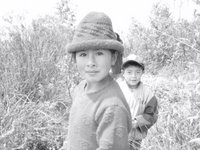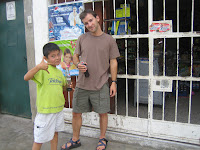On Monday Nov. 20th, I hiked out of Carata to Motil to catch a bus. I had been in site for two weeks and was stirring to get out. I hadn’t bathed for days because there was little water and I was too lazy to take a bucket bath (I prefer a full outright shower even if it is ice cold) but the water barely trickles from the sink with such little pressure.
Juan followed me on his dirt bike, carrying my luggage to the main road. No buses passed for quite some time. I could feel my nose burning in the sun. Where the hell was my sun block? Burried in my luggage. I have to wear sun block every day on my face-at such a high altitude I’ve burned easily. I was carrying a hiking bag and my laptop. Just enough luggage for ten days in Huaraz and
We waited, and waited. It’s really become normal at this point all the waiting that is. If I’m not waiting for transportation, I’m waiting for a meeting to start, or a phone call, or maybe a friend or for my mail in customs. I imagine any future waiting experiences in my life time, won’t even compare to all the waiting I’ve done this past year in
In this one circumstance I passed an easy 8 hours on the side of the road. Juan left to beat the threatening rain. More than 10 buses, 5 cars, 3 combis, 6 trucks and a mess of sheep and donkeys had crossed my path. Finally just before it got dark and cold my savior arrived-a mining bus. These buses don’t even pick up passengers-due to the contract they have with a gold mine companies north of where Carata lies. The big red beauty came barreling down the mountain empty, I’m sure they noted the helplessness in our faces. They could make some extra change by picking us up and as long as we promised to keep the curtains closed as we passed the high way control station. I felt like Ann Frank, hiding but thankful to be alive.
Oh, you may wonder why I waited so long for a ride? The day before was election day for local governments. As for the presidential election this election is also mandatory (It’s the only law Peruvians uphold). So with this in mind, buses were at their capacity. Everyone who works in one district had to travel back to their home districts based on their permanent address. This means a lot of shuffling of people from the coast to the sierra and vice versa. Juan and Mena have an Uncle who lives in
That next morning I attended a nutrition workshop at my friend Khaliah’s site, Chao ( 50km south of
Khaliah had invited other health volunteers from different departments to act as guest facilitators for the day. I was delighted to help but also stressed to put something creative together and arrive in one piece since surviving the atrocious previous day. 8 health promoters attended and a nutritionist, and Khaliah’s counterpart, Margot and her supervisor, and the three of us volunteers.
One of our friends was planning on attending but the workshop but was trapped in her site to a strike and rioting as a result of the election. The public was obviously unhappy with the newly elected mayor and officials. They had closed the roads preventing any cars from coming or going and cut telephone lines. She had to be evacuated by peace corps.
(I later found out another similar situation occurred where my friends’ Jimmy and Lenah (a married couple) live. But the public rioting was so bad the town hall was burned, school computers were destroyed, and other public buildings ransacked. And I thought the college riots in
Just a side note, getting back to the nutrition workshop…. I really enjoyed seeing Devina (who works in the sierra of Cajamarca) and Adiana who works in the
That night we all got on an overnight bus east to Huaraz, Ancash the most beautiful region of the Peruvian Andes. I didn’t sleep. Mostly because of the strange man sitting next to me. I actually woke myself up, startled, thinking he was stealing my glasses off my face. What a nightmare! Remember “Adventures in Babysitting”?
To be continued....
